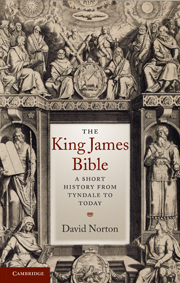Book contents
- Frontmatter
- Contents
- List of illustrations
- Preface
- List of abbreviations
- 1 Predecessors
- 2 Drafting the King James Bible
- 3 ‘I was a translator’
- 4 Working on the King James Bible
- 5 1611: the first edition
- 6 Printing, editing and the development of a standard text
- 7 Reputation and future
- Select bibliography
- Index
1 - Predecessors
Published online by Cambridge University Press: 05 June 2012
- Frontmatter
- Contents
- List of illustrations
- Preface
- List of abbreviations
- 1 Predecessors
- 2 Drafting the King James Bible
- 3 ‘I was a translator’
- 4 Working on the King James Bible
- 5 1611: the first edition
- 6 Printing, editing and the development of a standard text
- 7 Reputation and future
- Select bibliography
- Index
Summary
ORIGINALS AND TEXTS
THE ORIGINALS
The most important book in English religion and culture, the King James Bible, began to be created at some unknown moment nearer three than two thousand years before 1604, the year in which James VI and I, king of Scotland, now also king of England, assembled the religious leaders of the land at Hampton Court and, seemingly by chance, ordered the making of a new translation of the Bible. That unknown original moment of creation came when the descendants of Abraham moved beyond telling to writing down their beliefs and the stories of their heritage. It was a crucial moment in civilisation. The ancient Hebrews began to be the people of the written word. Their writings became the collection of books we know as the Old Testament. It enshrined their knowledge of themselves and of their relationship to their God. Without it they might not have survived as a people, and without it the Christian world – perhaps also the Islamic world – would have been something unimaginably different from what it is.
The word of God was all in all to the religious Jews. In the beginning God talked with Adam and Eve as a lord to his tenants, person to person, then to Moses ‘face to face, as a man speaketh unto his friend’ (Exod. 33:11).
- Type
- Chapter
- Information
- The King James BibleA Short History from Tyndale to Today, pp. 1 - 32Publisher: Cambridge University PressPrint publication year: 2011



